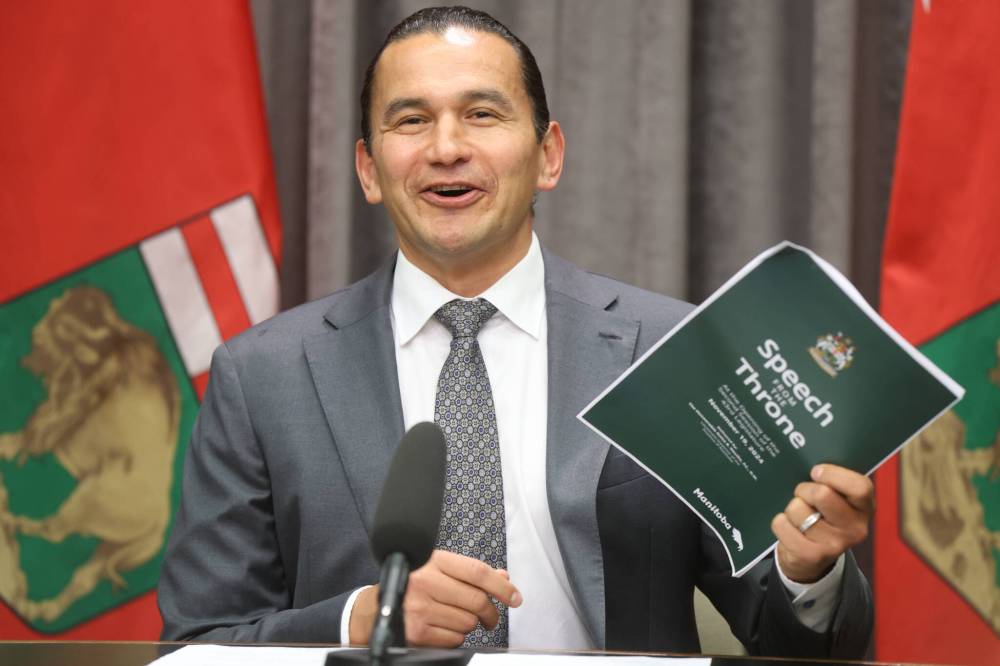Manitobans can expect a crackdown on grocery store non-competition and initiatives to reduce surgical backlogs during the coming year.
New affordability measures, health-care goals and reconciliation-related announcements are among the highlights in the Kinew government’s second throne speech.
The 14-page document was read by Lt.-Gov. Anita Neville Tuesday to mark the second session of the 43rd legislature.
Here are 10 takeaways:
Grocery-retail competition legislation
The NDP will draft legislation to ban the practice of large businesses freezing out competition in a bid to increase the number of grocers and lower food prices.
Premier Wab Kinew said Manitoba could be a leader in ending the practice of “restrictive covenants.”
Kinew said the status-quo system allows big supermarket chains to essentially draw a circle on a map when they set up a location to prevent competition.
More hip and knee replacements
Addressing surgical backlogs in the Interlake-Eastern Regional Health Authority is among the priorities.
The province is aiming to add 800 more hip and knee replacement procedures every year at the Selkirk Regional Health Centre.
Three new hires — two surgeons and an anesthesiologist — will carry out the pledge to scale up the number of procedures. The initiative is expected to cost about $4 million.
Hydroelectric rate freeze
Manitobans can expect some financial relief on their Manitoba Hydro bills in 2025.
The NDP is making good on a campaign promise to freeze electricity rates for a year.
New statue outside the Manitoba legislature
The government will commission a piece of artwork depicting two bison — a mother and child — to be installed on the front lawn of the Legislative Building.
It will replace a historic monument of Queen Victoria that was toppled on Canada Day in 2021 during a demonstration over the deaths of Indigenous children at residential schools.
The new statue will serve as “a reminder of the sacred bonds of family that were harmed in the residential school era.”
New health cards
Manitobans will be able to apply for new plastic health cards before the end of 2024.
The personal identification, which will replace paper cards, will feature a photo of the sky illuminated by green northern lights.
Curriculum changes

Premier Wab Kinew speaks to media during a press conference about the throne speech. (Mike Deal / Free Press)
All Grade 9 students will soon be required to complete a unit on financial literacy in order to obtain a high school diploma.
An updated science curriculum, currently in the pilot phase, is also being finalized.
The throne speech also offers hints that a new program is being developed to send high school students to the historic battlefields of the First and Second World Wars.
Indigenous education
The government wants to ensure all First Nations people, including citizens living on reserve, have a right to vote in school board races.
Bolstering Indigenous language education “in the very places where (it) was once silenced” is also included in the throne speech.
All-party committee to probe press freedom
Kinew, a former CBC reporter, plans to create a team of MLAs of all political stripes to investigate the future of local journalism.
Against the backdrop of growing misinformation and polarization, the government wants to explore how to support news media, including rural and ethnocultural publications.
Economic support
Two additional Manitoba Agricultural Services Corp. offices will open next year.
The province has also announced plans to launch an “Indigenous loan guarantee program” to help launch big energy projects.
AI strategy
Citing concerns about the dangers of rapidly advancing technology, the government is working on a project to guide artificial intelligence use.
New legislation is also slated to tackle third-party and foreign interference in elections.
maggie.macintosh@freepress.mb.ca

Maggie Macintosh
Education reporter
Maggie Macintosh reports on education for the Free Press. Originally from Hamilton, Ont., she joined the newsroom as a reporter in 2019. Read more about Maggie.
Funding for the Free Press education reporter comes from the Government of Canada through the Local Journalism Initiative.
Every piece of reporting Maggie produces is reviewed by an editing team before it is posted online or published in print — part of the Free Press‘s tradition, since 1872, of producing reliable independent journalism. Read more about Free Press’s history and mandate, and learn how our newsroom operates.
Our newsroom depends on a growing audience of readers to power our journalism. If you are not a paid reader, please consider becoming a subscriber.
Our newsroom depends on its audience of readers to power our journalism. Thank you for your support.